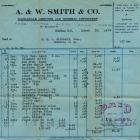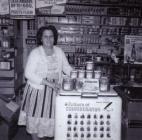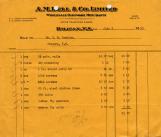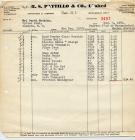1
Store Stock: From a Needle to an AnchorThe W.M.O. Mitchell store, later called the Hosking General Store, was typical of village general stores that operated across the country before centrally located "supermarkets" made these local stores obsolete.
Yet these village stores were the supermarkets of a different era. They too allowed the shopper to get "everything - all under one roof". They stocked hardware, groceries, dry goods, clothing, textiles, fishing and hunting supplies and more. In fact, they could sell you anything "from a needle to an anchor."
3
In this 2004 interview, Reg Daye recalls the contents of the store:"You'd get your salt beef. That would come in barrels. Western beef. Cornedbeef. My God that was good beef. That was still coming in here after the Second World War. That's the best cornedbeef that you could buy. All Western beef.
The saying is, used to be, you could buy anything from a needle to an anchor. They had the hardware. Now when you went in Willie O Mitchell's store, here on your right was a counter that went right through to here. And there was another counter this way.
Now, from this counter down to the wall, and hanging along the ceiling, down towards the road, was pots and pans. And then up further it was clothing. You could even get a tip top tailor suit for twenty dollars. And there was foot wear. Oh, it was well stocked."
5
The store is remembered for being packed to the ceiling with things. This note, which was found folded up in an account book, gives a sense of the kind of sundry items "Willie O" had on hand.At the bottom of the order Mrs. Chas writes "and if you have a rubber to fit this shoe will you kindly fit them for me and I will settle up with you as soon as I possibly can."
In an interview from 2004, Mavis Turple recalls being sent to Willie O's as a child, often to get a jug of molasses or a container of kerosene.
"As I remember him he was a kind of a stout man with a ruddy complexion. And they had quite a variety of things there, you could buy anything from a doll for Christmas to a gallon of kerosene oil. And of course molasses. You got that in your own container too. Which was quite different than it is today. It was so granular then and of course more refined today. Of course it was always outside in the back where it was cold and it would take it a long time to run out. That must be where the got the saying about being 'as slow as cold molasses' I guess. I don't really remember the molasses, but I know for the kerosene it was a little metal thing, it probably held about a gallon, and had a spout on it so you could pour it out in the lamp, and of course some people used that too for starting their fires in their wood stoves years ago."
7
Mildred Hosking employed several local women on occasion when she needed help or had to go to the city for supplies. This photograph of Edna Mitchell is one of the few images showing the inside of the store, with the stock on the shelves.In an interview from 2004, Barbara Siteman recalls how well the shelves were stocked. In the interview she refers to the Hosking Store being a "Lee Store". She is comparing the store to similar one in Ship Harbour run by Lee Siteman. Lee's store also carried everything from a needle to an anchor.
"Everything. There was everything. It was a Lee store. There was everything in it. Yep, everything. There was boots, and rain gear, and coveralls. There was underwear. Men's coats. A lot of hunting stuff. And T-shirts, like the Jeddore T-shirts. And the thick pants. Cloth diapers, I remember those. Houseware, there was everything. There was tubs and containers. Pots and dishes. Silverware. Canned goods. She'd get every two weeks she'd get them from Clover. The cabbage, the carrots, the turnip, when someone, a farmer, didn't bring it to her. Be dates in a box. Be prunes in a box. Cover off and it would be all lined with that thick, brown wax paper."
9
By the 1940s many of the items sold in bulk, such as biscuits and lard, were being packaged in smaller sized containers. In this 2004 interview, Elaine Dooks (daughter of Garth and Mildred Hosking) remembers what came in bulk through the 1950s and into the early 1960s:"I don't remember carrots in bulk. They must have been packaged. But the potatoes, the meat, kerosene, and molasses. And nails, oh good gracious! You know people would want five pound of nails, maybe not even five pounds, probably a pound of nails, or something. I didn't like weighing those out, either. They came in little wooden barrels. Oh cheese! We used to get wheels of cheese. Yes. And we'd have to cut the cheese. Somebody would just sort of say "well I'll have that much", and you know, sort of put their finger. It was in a big black container, like a glass cover on it. It wouldn't have been refrigerated. There was no refrigerator. I mean, there was pop coolers and ice cream cooler. The cheese must have just sat out, I guess. And that was another thing that wasn't real fun to cut. But it seems to me, we had a two handled knife, and sort of wedged it down through. And I always liked the dry goods side. And there was always some pretty cups and saucers, and dishes. Like, I suppose gift items. And just today I was thinking about boxes of stockings. Because back then, there weren't panty hose, there were stockings, with the seam up the back. And they came in boxes with tissue paper. They were folded individually in tissue paper. And wash tubs, there was a wash tub, and all this stuff hung from hooks in the ceiling."
11
In the early 1950s, Garth and Mildred Hosking would take the kids and go to Truro to pick out toys and other novelties for their Christmas merchandise. The Christmas room is well remembered in the community. The upstairs room, once the ice cream parlour, displayed Christmas toys and other gifts.In this interview from 2004, Elaine, Garth and Mildred's daughter, describes the Christmas display:
"Another thing I remember about the store, too, and this would have been Mum and Dad who did that. They used to use the upstairs for the Christmas stock. They would go to Truro, to a show, as people go to gift shows now. And it was T.S. Pattillo, I believe, and they would buy all the Christmas stuff, and then, Oh, I don't know when, I suppose no earlier than the first of December, they would set up the upstairs, and have the Christmas toys, and all things related to Christmas, up there. So that's always used to be fun. I imagine I was always pretty eager to help with that one."
13
Barbara (on the left) helped out at the store as a child. Sometimes Mildred would give her small gifts in return for sweeping the floor or making up boxes of groceries. Later on, as a teenager, she worked for Mildred after school, on weekends and during the holidays.In this interview from 2004, Barbara remembers working for Mildred Hosking during the late 50s and early 60s.
"And then when I was nine, no ten, I used to sweep and clean outside, and pack groceries, and do the barrels, clean the coolers, dip you down in the cooler and clean all the ice out of the cooler.
We used to clean out the car, make up boxes, and tape the bottoms. Like it was just more fun. You'd get to go over there. You'd get to come up from school and go over there, 'cause everyone was there. You know, just meet after school. She would give you little gifts. Oh stuff like that. Yep.
And then when I was what six, seventeen I think it was, I worked over there after school. Packed groceries. Used to drive groceries up to the lodge, go down the East Jeddore. Deliver groceries after school and Saturday morning. Work in the store Saturday, Friday and Saturday morning."





